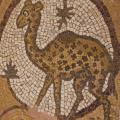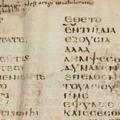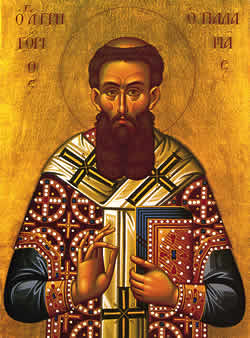323. Through His Works You Shall Know Him: Palamas and Hesychasm
Gregory Palamas and the controversy over his teaching that we can go beyond human reason by grasping God through his activities or “energies”.
Themes:
• J. Meyendorff (trans.), Gregory Palamas: the Triads (Malwah: 1983).
• R.E. Sinkewicz (ed. and trans.), Saint Gregory Palamas: The One Hundred and Fifty Chapters (Toronto: 1988).
• D. Bradshaw, Aristotle East and West: Metaphysics and the Division of Christendom (Cambridge University Press, 2004).
• K. Ierodiakonou, “The Anti-Logical Movement in the Fourteenth Century”, in K. Ierodiakonou (ed.), Byzantine Philosophy and Its Ancient Sources (Oxford 2002), 219-36.
• J. Meyendorff, A Study of Gregory Palamas, trans. G. Lawrence (Leighton Buzzard: 1974).
• J. Meyendorff, Byzantine Hesychasm: Historical, Theological, and Social Problems (London: 1974).
• J. Nadal Cañellas, La résistance d’Akindynos à Grégoire Palamas, 2 vols (Leuven: 2002).
• R.E. Sinkewicz, “The Doctrine of the Knowledge of God in the Early Writings of Barlaam the Calabrian,” Medieval Studies 44 (1982), 181-42.
• T.T. Tollefson, Activity and Participation in Late Antique and Early Christian Thought (Oxford: 2012).
• A.N. Williams, The Ground of Union: Deification in Aquinas and Palamas (Cambridge: 1999).







Comments
Praise for series
I love your series for its breadth, for its spaciousness and comprehensiveness. Your discussion of Palamas was excellent (not that I expected anything less), and your bibliography was very solid.
In reply to Praise for series by Paschal Scotti
Thanks
Thanks so much! Glad you liked this episode in particular and of course the series in general.
I see an obvious parallel
I see an obvious parallel between the Hesychasm controversy and the debates over Theurgy between Porphyry and Iamblichus, the difference being that both sides are not allowed to entertain the possibility of directly knowing God itself and so must argue if the ecstatic ritual can instead grant knowledge of the nous/divine energy emanating from God.
In reply to I see an obvious parallel by Arouet
Parallel to theurgy
Yes, that's a nice point and in fact this is the second time we've had such a parallel, the first time being with icons. Of course Orthodox admirers of Palamas would not appreciate the comparison to pagan theurgy but I agree there is a similarity at the philosophical level.
On the theology of Palamas's critics
This is an excellent discussion, and I am grateful to you for this series of lectures; I am eager to listen to more of them. Nevertheless, a couple of brief criticisms. Your title, “Through His Works You Shall Know Him,” in fact properly describes the teaching, not of Gregory Palamas, but of Palamas’s opponents, because Palamas interprets the term ἐνέργεια (“energy”) to mean, not a work of God, but God himself.
This criticism turns on a common misunderstanding of Palamas’s opponents, which is promoted by Palamas himself (who claims, for instance, that they teach that God is “without energy”). All of them — Barlaam, Akindynos, Gregoras, and the rest — maintain that the term ἐνέργεια, when used by the fathers of the Church in speaking about God and his activities, has two distinct meanings which ought not to be confused. On the one hand, the word ἐνέργεια (energy, activity) is sometimes synonymous with ἐνέργημα: something done or worked. So, for instance, when St. Basil the Great, in a famous passage, states that "the energies of God come down to us, the essence remains hidden," Akindynos and the other Antipalamites understand this text to mean, not that a group of spiritual adepts is given a private vision of uncreated divine light, as in the hesychast reading, but that God manifests himself in the world through the things which he has done, i.e., through his works (as in your title). As stated in Psalm 19, Romans 1, and other places in Scripture, the being and goodness and beauty of the creatures declare the glory of their creator, and God is known in history through his saving acts of redemption. In this sense of the term, ἐνέργεια is both created and knowable. But (according to the Antipalamites) there is another, distinct sense of ἐνέργεια, in which ἐνέργεια is not equivalent to ἐνέργημα, i.e., is not a passive result of divine activity, but is uncreated, the very activity of God, residing in God himself and, in fact, identical with him.
Both Palamas and his opponents teach that there is no nature that does not have its own proper activity, and that this is true also of God’s own nature. But the Antipalamites disagree with Palamas in holding that this uncreated "energy" (which, in fact, God is) is neither visible nor ontologically distinct from God himself — i.e., from God’s nature. Because God is supremely simple, God is identical with whatever God has (which is why God is not only “good,” but “the Good”); Palamas denies this view of divine simplicity, explicitly claiming that whatever God “has” has to be distinct from what God “is.” In any case, Akindynos, Gregoras and the others think that Palamas has misunderstood the traditional, patristic distinction between created and uncreated energy, and that he routinely misrepresents their own position, claiming that they deny that God has any uncreated energy, when, in fact, not only do they not deny God’s uncreated energy, but they maintain, precisely, that God’s uncreated energy is God himself; by contrast, they see Palamas, by introducing a real ontological distinction in God between essence and energy, to be introducing into Christian theology ideas of a “greater” (unknowable) and a “lesser” (knowable) divinity that smack of paganism.
Sorry for the long and somewhat technical note.
In reply to On the theology of Palamas's critics by Peter Gilbert
God's "Work"
Actually I thought quite a bit about this and whether I should not use the title, for precisely the reason you say. Eventually I decided that it would be (and I think it is) crystal clear in the episode script itself that Palamas is saying that God's energeiai, e.g. the light seen by mystics, are divine and uncreated; and that Palamas' opponents denied this. So I figured that no one would come away from the episode without understanding what you say here in your note. Plus the English "work" seems to me just about ambiguous enough that it could perhaps cover an uncreated energy (even if it would more usually be used to translate Greek "ergon"). In general of course the episode titles are usually more or less just jokes, not a technical guide to the issues explored in the actual text of the episodes. So in the end I figured that I could just about get away it, plus it is a nice snappy title and I couldn't think of a better one.
But if you have a criticism of anything in the episode, as opposed to just the title, it would be useful to know that because you obviously know what you are talking about!
Indivisibly divided
There have been some very interesting papers written in the last couple years on Palamas' idea that the essence and energies are "indivisibly divided". One particularly interesting treatment of it was Mark Spencer's paper "The Flexibility of Divine Simplicity", which tries to revive Gennadios Scholarios' idea that Palamas' "indivisible division" should be seen as fundamentally in agreement with Scotus' idea of "formal distinction". Some of Palamas' language is really suggestive here, for example when he described the essence and energies as "One, but not indifferent, i.e., the same and not the same in different manners." Especially the first part of the sentence, which distinguishes numerical oneness from the "difference" that doesn't compromise that oneness, really sounds like something Scotus might write. Of course, Spencer notes that there are important differences in the way Scotus and Palamas cash out the distinction, in that Palamas seems to be using a kind of formal distinction that pushes the boundaries of what "formalities" can be a little more than Scotus does, but I really do find the argument convincing that the agreement is greater than the disagreement here.
What's interesting about this is that it seems like Palamas and Scotus are invoking the distinction for almost the exact opposite reasons. Palamas worries that the rigid insistence on simplicity in Aquinas and his own opponents renders impossible the sort of direct, non-discursive experience of God that he and his supporters believed they had, whereas Scotus worries that the idea of analogy that Aquinas needs to preserve God's simplicity strips human language concerning God of any mean. Simplifying a little bit, it seems like Palamas is criticizing Aquinas for being too rationalistic, and Scotus is criticizing him for not being rationalistic enough. This makes it more than a little odd that their modifications to the doctrine of Divine Simplicity are so similar.
Symeon the New Theologian under Byzantine Timeline
Can you link this episode to the Byzantium timeline under Symeon the New Theologian name, it will be easier as sometimes I use the the timeline feature.
Do you happen to remember when you mention the 2 other Byzantine philosophers in your series as their names do not have a hyperlink, Eustathios and Theodore Prodromos.
Theodore Prodromos was mentioned in the interview with Ierodiakonou.
In reply to Symeon the New Theologian under Byzantine Timeline by dukeofethereal
Links
Thanks for catching those - I think actually Eustathios was never mentioned (I just searched the book version and he doesn't turn up except in a footnote).
In reply to Links by Peter Adamson
Joseph Rhakendytes
Joseph Rhakendytes was also mentioned in this interview episode https://www.historyofphilosophy.net/byzantine-commentaries-ierodiakonou
But I don't know where it was mentioned in the scripted episode.
https://www.historyofphilosophy.net/timelines/byzantium
Add new comment